
 Cameron Thompson
The Hockey Writers
Cameron Thompson
The Hockey Writers
43
Reads
0
Comments
Blue Jackets Seeing Signs of Wennberg Returning to His Old Form
At the time of his selection with the 14th-overall pick in the 2013 NHL Entry Draft, Alexander Wennberg was seen as a key piece for the Columbus Blue Jackets franchise moving forward as a possible top-line or top-six center as the first selection of newly hired Finnish general manager Jarmo Kekalainen.
However, in the seven years that have followed, Wennberg’s trajectory as a player has been anything but linear or consistent.
Related: Columbus Blue Jackets’ RFA Pierre-Luc Dubois Dominates In Playoff Run
Since his arrival in Columbus, he has seen multiple players pass him on the depth chart up the middle like Pierre-Luc Dubois and even some wingers moving to the middle to compensate such as Nick Foligno and Boone Jenner for the lack of center drive-in play.
That being said, Wennberg is by no means a liability defensively as he is a stellar defender with a great stick and positioning. The problem is that he has become too offensively timid in a number of areas ever since a breakout 2016-17 season where he amassed 13 goals, 46 assists and 59 points.
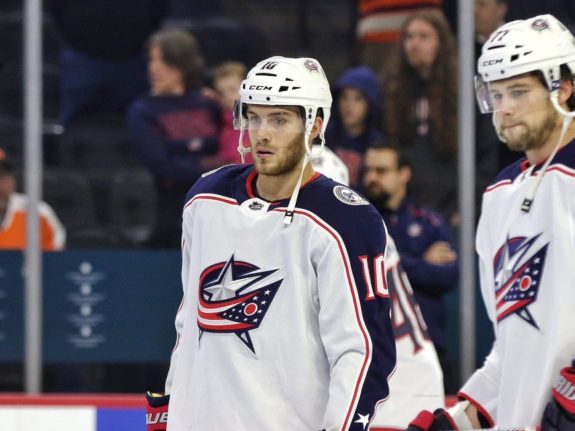
It has been a long road of frustrations for Wennberg, but this past season and into the Stanley Cup Playoffs has shown some glimpses of his game that have been missing since his early years as well as that breakout 2016-17 season.
Wennberg’s Rise to Form
Coming out of the 2013 NHL Draft, Wennberg was seen as the prototypical skilled center with great skating, playmaking ability and showcased that dominance on the international stage.
Not only did Wennberg drive play by carrying and holding the puck, but he also rewarded his shooting wingers by finding them with tape-to-tape passes in dead ice while drawing coverage leading to goals. That showed with 32 assists in the 2015-16 season that included 11 power-play assists in a limited role.
The very next season, Wennberg had his career year of 46 assists and 59 points while also leading the Blue Jackets in power-play points with 23 and power-play assists with 21. A big part of that step forward is no doubt Wennberg progressing, but also the signing of Sam Gagner and the arrival of then-rookie defenseman Zach Werenski.
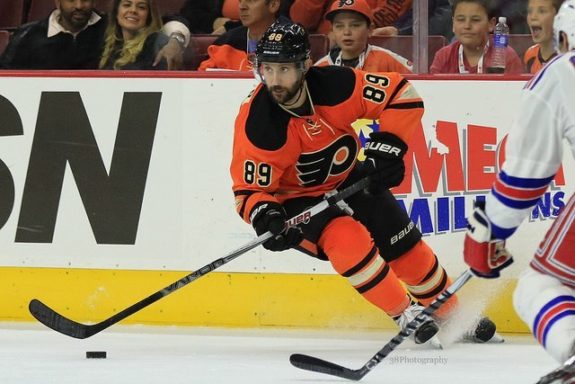
Cam Atkinson, Foligno, and Werenski were tied for second in power-play points with 21, while Gagner was third with 18. However, Gagner’s creativity in the middle along with Wennberg on the half-wall was the engine of the Blue Jackets’ power play. A power play that was top-5 in power-play efficiency for multiple months for the first and only time in Wennberg’s tenure so far as a Blue Jacket.
Turning the page to the 2017-18 season, Wennberg had a strong start to the but missed time with a back injury that happened against the Pittsburgh Penguins on Dec. 21, 2017. When coming back near the trade deadline, the Blue Jackets traded for a skilled, veteran winger in Thomas Vanek from the Vancouver Canucks for the playoff push.
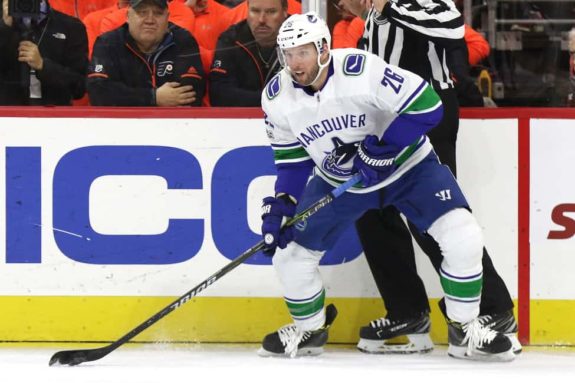
The combination of Wennberg and Vanek along with Jenner proved to be a difference-making line down the stretch. It showed in Vanek’s 19 games as a Blue Jacket, picking up up a stat line of 7 goals, 8 assists, and 15 points. Wennberg looked like he would take an even bigger step forward in his game as the Blue Jackets were set to take on the Washington Capitals in the first round of the 2018 Stanley Cup Playoffs.
Wennberg’s Play Takes a Hit
After going 13-2-2 in the final 17 games of the season, Wennberg and the Blue Jackets were ready to take on a Capitals’ team that, once again, had aspirations for a Stanley Cup Championship.
In Game 1, Wennberg got his first playoff goal off a feed from Jenner and Vanek with a confident move around Philipp Grubauer to cut the lead from 2-1 in the second period. However, early in the third period, Wennberg absorbed a huge hit to the head in the corner of his own zone.
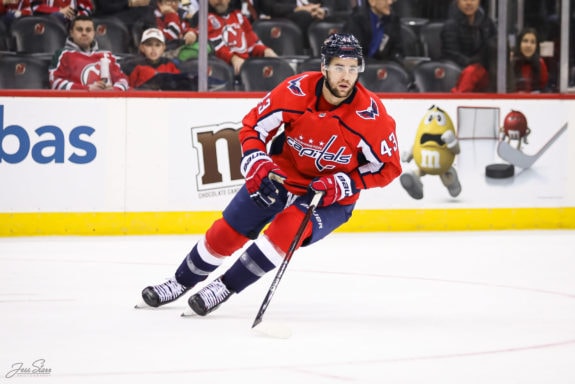
The blindside hit to the head came from none other than Tom Wilson and knocked Wennberg for a few games before coming back for Game 5. The Blue Jackets were eliminated by the eventual Stanley Cup champions in six games.
Upon Wennberg’s return to the series, it seemed that he was timid offensively, not going to the dirty areas, and just wasn’t engaged offensively. Ever since that big hit by Wilson on Wennberg in 2018, many people speculated that it might have been the last time we saw an offensively impactful Wennberg.
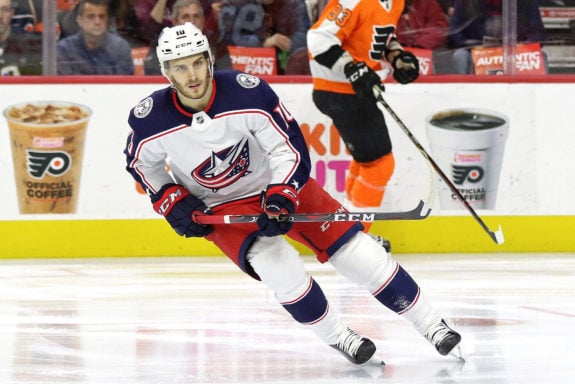
When signing a six-year, $29.4 million contract with the Blue Jackets after the 59-point, breakout 2016-17 season, the team thought that he would progress into a dominant, skilled center and become a bargain down the middle. But nobody, not even Kekalainen, could’ve seen the decline that was coming in the 2018-19 season.
While the defensive side wasn’t a problem for Wennberg, the problems closer to the offensive zone just seemed to be more glaring and frustrating. You never saw him move the puck through the zone with speed and confidence, you would only see him get rid of the puck as quickly as he would get it.
Related: Realistic Blue Jackets Expectations For the Offseason
The 2018-19 season brought the Blue Jackets a Wennberg that was a shell of his former self. One that doesn’t use his shot to create opportunities, doesn’t hold on to the puck to make plays as a playmaker or has any sort of presence on the power play.
Blue Jackets head coach John Tortorella even stopped a practice dead in its tracks during this season to gather pucks and have Wennberg shoot on goal for all of his teammates to see. This season Wennberg took 45 fewer shots than he did in his breakout season and his ice time fell from 18:23 per game to just 15:05 per game in five fewer games.
The contract that looked to be a bargain after a strong first season, was an anchor to the cap structure of the team by year two.
Wennberg Shows Glimpses of Form
Putting the disastrous 2018-19 season behind him, Wennberg was set to be either a second or third-line center at the start of the season. With the arrivals of rookie forwards like Alexandre Texier or Emil Bemstrom, the hope was that Wennberg would gain some chemistry with one of the players and take advantage of their youthful exuberance.
Bemstrom was a huge power-play presence with Djurgardens IF of the SHL and was impactful well into the playoffs. If he could be inserted on the power play with Wennberg, perhaps chemistry would grow there and give Wennberg the confidence that would spread to other aspects of his game.
However, the biggest move that hoped to get Wennberg’s game back on track was the addition of fellow Swedish forward Gustav Nyquist. Nyquist signed a four-year, $22 million contract with the Blue Jackets after spending his first eight seasons in the NHL with the Detroit Red Wings before being traded to the San Jose Sharks at the 2018-19 Trade Deadline.
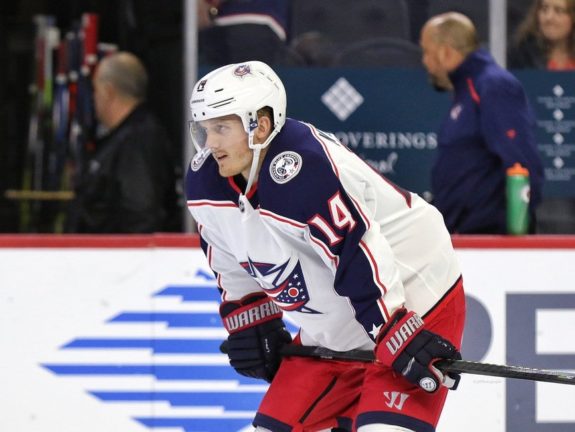
Wennberg and Nyquist have had noted chemistry in international play for Sweden as they each led the team in points with eight in the 2016 IIHF World Championship. Wennberg had one goal and seven assists while Nyquist had seven goals and one assist. Although Nyquist’s time on Wennberg’s wing was limited, you could see Wennberg feeling more comfortable as the 2019-20 season went on.
Related: From Sweep to Defeat: What Changed for the Blue Jackets?
As the 2019-20 season went on, you could see old habits returning on the ice for Wennberg. He shot the puck eight more times than he did all of last season with 18 fewer games. His ice time went up from 15:05 per game to 16:41, albeit because of a plethora of injuries. He was using his elite skating ability carrying the puck up the ice and around the offensive zone looking for options. Also, he was a presence on the power play in front of and behind the net, even if he didn’t get on the score sheet most nights.
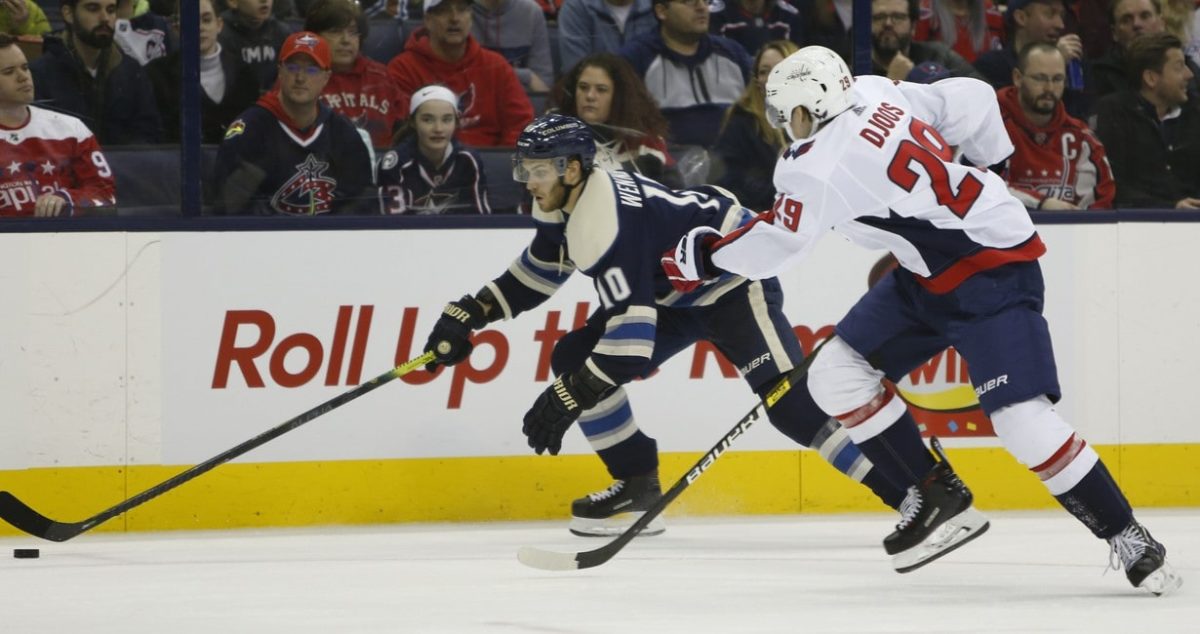
Moving past the long pandemic pause into the 2020 play-in round and the postseason against the Toronto Maple Leafs and the Tampa Bay Lightning, Wennberg needed to step up and bring a veteran impact and he did. He posted 3 goals and 2 assists in 10 playoff games, showing consistent, strong defensive play as well as dynamic offensive ability for the first time since the 2018 Playoffs.
Wennberg’s 2020 Playoff performance was solid against the Maple Leafs, but really took off and was an impactful player at both ends of the ice against the Lightning in Game 5 with a two-point night where he could’ve had four. Not to mention an incredible individual effort to walk around Kevin Shattenkirk for a goal-of-the-year candidate in a Game 2 victory.
Hope for the Future
The 2019-20 season was a season of learning for the Blue Jackets in many ways. First, knowing what they have in their depth and farm system due to the numerous amount of injuries endured this season. Second, what they have in veteran players that stayed healthy and leadership they showed with multiple AHL players entering the lineup. Finally, the maturity of young core players sho took the next step in their development due to the opportunity.
To be clear, no one should expect the 2016-17 Wennberg to show up to camp next year and challenge Dubois for the No. 1 center spot. What they can expect is a Wennberg that has more confidence in his game and that could possibly grab the No. 2 center spot even if it most likely will be a solid No. 3 option for the Blue Jackets.
Related: Blue Jackets – Lightning Game 5 Notes: Columbus Playoff Bubble Bursts
Perhaps the Blue Jackets could make a big splash in the trade market and move some pieces around which could spark the game of many forwards, including Wennberg. However, even if you can see his old habits coming back, there is no guarantee or trust that he will return to form, just glimpses of hope.
The post Blue Jackets Seeing Signs of Wennberg Returning to His Old Form appeared first on The Hockey Writers.
Popular Articles

















































 Blackhawks Chicago
Blackhawks Chicago Panthers Florida
Panthers Florida Penguins Pittsburgh
Penguins Pittsburgh Rangers New York
Rangers New York Avalanche Colorado
Avalanche Colorado Kings Los Angeles
Kings Los Angeles Maple Leafs Toronto
Maple Leafs Toronto Bruins Boston
Bruins Boston Capitals Washington
Capitals Washington Flames Calgary
Flames Calgary Oilers Edmonton
Oilers Edmonton Golden Knights Vegas
Golden Knights Vegas Flyers Philadelphia
Flyers Philadelphia Senators Ottawa
Senators Ottawa Lightning Tampa Bay
Lightning Tampa Bay Red Wings Detroit
Red Wings Detroit Islanders New York
Islanders New York Sabres Buffalo
Sabres Buffalo Devils New Jersey
Devils New Jersey Hurricanes Carolina
Hurricanes Carolina Stars Dallas
Stars Dallas Jets Winnipeg
Jets Winnipeg Blue Jackets Columbus
Blue Jackets Columbus Predators Nashville
Predators Nashville Wild Minnesota
Wild Minnesota Blues St. Louis
Blues St. Louis Mammoth Utah
Mammoth Utah Ducks Anaheim
Ducks Anaheim Sharks San Jose
Sharks San Jose Canucks Vancouver
Canucks Vancouver






